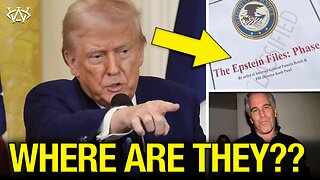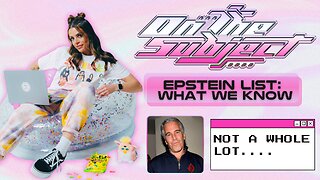Premium Only Content

Streamlining Your Operations: Mastering the ISF Filing Process for LCL Shipments
ISF Filer || isf@isffiler.com || 858-280-9374 || www.isffiler.com
ISF filing is an integral part of the customs clearance process for all imports into the United States. Understanding the requirements and procedures associated with ISF filing is crucial for importers and customs brokers alike in order to avoid penalties and delays. The Importer Security Filing (ISF) is a mandatory requirement enforced by US Customs and Border Protection (CBP) with the aim of enhancing security and facilitating the customs clearance process. Customs bonds, on the other hand, are financial guarantees that ensure compliance with importation laws and regulations. They are required for most commercial shipments entering the United States and provide protection for the government in case of violations or non-compliance. When it comes to LCL shipments, which stand for Less than Container Load, the ISF filing process becomes even more critical. LCL shipments involve consolidating multiple smaller shipments into a single container, often resulting in more complexities and potential for errors. Working with a knowledgeable customs broker is essential in order to navigate the complexities of the ISF filing process for LCL shipments. Customs brokers are licensed professionals who specialize in clearing goods through customs. They possess a deep understanding of customs regulations and documentation requirements, which is invaluable when it comes to ensuring a smooth and efficient ISF filing process. The information required for ISF filing for LCL shipments includes the shipper's details, consignee's details, container stuffing location, and other pertinent information. Accurate completion of the ISF filing is crucial to avoiding penalties and delays. Once the ISF is filed, it is important to monitor its status and address any issues or discrepancies promptly. Timing is crucial, as the ISF must be submitted at least 24 hours before the cargo is loaded onto the vessel. Failure to meet this deadline can result in fines and potential delays in customs clearance. Throughout the shipment's journey, it is important to ensure that the container is properly sealed and that the seal number matches the information provided in the ISF filing. Broken or mismatched seals can raise security concerns and cause delays. When the vessel arrives at the US port, the customs broker will work closely with the importer and the shipping carrier to facilitate a smooth arrival and subsequent customs clearance. This may involve providing necessary documentation to customs officials and addressing any queries or concerns they may have. Effective communication between the importer, customs broker, and shipping carrier is vital in maximizing efficiency in the ISF filing process for LCL shipments. Timely sharing of information, accurate documentation, and proactive problem-solving can significantly reduce the chances of delays and penalties. In conclusion, understanding the ISF filing process for LCL shipments is crucial for importers looking to streamline their operations. By working with a knowledgeable customs broker and ensuring accurate and timely filing, importers can minimize delays and avoid costly penalties. Efficiency is key to success in the world of international trade.
#usimportbond #isfcustomsbroker #uscustomsclearing #isfentry
Video Disclaimer Here: This video is intended for educational purposes and has no affiliation with US government entities.
00:26 - ISF filing is crucial for LCL shipments to ensure security and streamlined customs clearance.
00:52 - Customs bonds are required for most commercial shipments entering the United States to guarantee compliance with import laws.
01:14 - Working with a knowledgeable customs broker is essential for a smooth ISF filing process for LCL shipments.
02:47 - Effective communication between the importer, customs broker, and shipping carrier is key to maximizing efficiency in the ISF filing process.
-
 33:56
33:56
The Why Files
9 days agoLegend of the 13 Crystal Skulls | From Mars to the Maya
86.8K43 -
 2:56:14
2:56:14
TimcastIRL
11 hours agoEPSTEIN Files DROP, FBI GOES ROGUE, AG Says They COVERED UP Epstein Case w/Amber Duke | Timcast IRL
207K128 -
 1:39:23
1:39:23
Kim Iversen
12 hours ago"Canada's Trump" Is Trudeau’s Worst Nightmare: Is Maxime Bernier the Future of Canada?
94.1K96 -
 DVR
DVR
Bannons War Room
10 days agoWarRoom Live
2.68M447 -
 16:06
16:06
The Rubin Report
18 hours agoProof the Islamist Threat in England Can No Longer Be Ignored | Winston Marshall
108K120 -
 2:07:07
2:07:07
Robert Gouveia
15 hours agoFBI Files Coverup! Bondi FURIOUS; SCOTUS Stops Judge; Special Counsel; FBI Does
135K96 -
 56:15
56:15
Candace Show Podcast
15 hours agoBREAKING: My FIRST Prison Phone Call With Harvey Weinstein | Candace Ep 153
187K118 -
 1:56:39
1:56:39
Flyover Conservatives
14 hours agoROBIN D. BULLOCK | Prophetic Warning: 2030 Is Up for Grabs – If We Don’t Act Now, Disaster Awaits! | FOC SHOW
69.8K20 -
 2:13:11
2:13:11
megimu32
12 hours agoON THE SUBJECT: The Epstein List & Disney Channel Original Movies Nostalgia!!
52.5K6 -
 9:06
9:06
Colion Noir
21 hours agoKid With Gun Shoots & Kills 2 Armed Robbers During Home Invasion
62.3K15